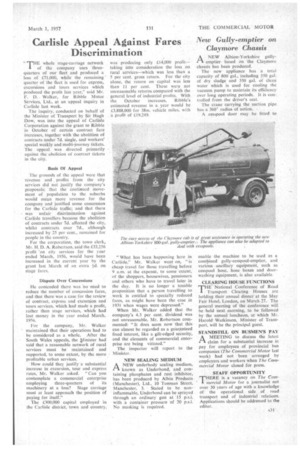Carlisle Appeal Against Fares Discrimination
Page 33

If you've noticed an error in this article please click here to report it so we can fix it.
" THE whole stage-carriage network of the company uses threequarters of our fleet and produced a loss of £71,000, while the remaining ' quarter of the fleet is used for express, excursions and tours services which produced the profit last year," said Mr. F. D. Walker, for Ribble Motor Services, Ltd., at an appeal inquiry in Carlisle last week.
The inquiry, conducted on behalf of the. Minister of Transport by Sir Hugh Dow, was into the appeal of Carlisle Corporation against the grant to Ribble in October of certain contract fare increases, together with the abolition of contracts under 7d. single, and workers' special weekly and multi-journey tickets. The appeal was directed primarily against the abolition of contract tickets in the city.
Basis Of Appeal The grounds of the appeal were that revenue and profits from the city services did not justify the company's proposals; that the continued movement of population to the suburbs would mean more revenue for the company and justified some concession for the Carlisle traffic; and that there was unfair discrimination against Carlisle travellers because the abolition of contracts under 7d. affected the city, whilst contracts over 7c1., although increased by 25 per cent., remained for people in the country.
For the corporation, the town clerk, Mr. H. D. A. Robertson, said the £33,256 profit 'art city services for the year ended March, 1956, would have been increased in the current year by the grant last March of an extra Id. on stage fares.
Dispute Over Concessions He contended there was ho need to reduce the number of concession fares, and that there was a case for the review of contract, express and excursion and tours services, which had made a profit, rather than stage services, which had lost money in the year ended March, 1956.
For the company, Mr. Walker maintained that their operations had to he considered as a whole. After the South Wales appeals, the Winister had said that a reasonable network of rural services must be maintained and supported, to some extent, by the more profitable urban services.
How could they justify a substantial increase in excursion, tour and express rates, Mr. Walker asked. "Can you contemplate a commercial enterprise employing three-quarters of its machinery at a loss? Stage carriage must at least approach the position of paying for itself."
The £300,000 capital employed in the Carlisle district, town and country, was producing only £14,000 profit— taking into consideration the loss on rural services—which was less than a 5 per cent, gross return. For the city alone, the return on capital was less than II per cent. These were not unreasonable returns compared with the general level of industrial profits. With the October increases, .Ribble's estimated revenue in -a ,year would be £3,888,000 for 38m. vehicle miles. with a profit of £19,249.
"What has been happening here in Carlisle," Mr. Walker went on, "is cheap travel for those travelling before 9 a:m. at the expense, to some 'extent, of the shoppers, housewives, pensioners and others who have to travel later in the day. It is no longer a tenable proposition that a person travelling to work is entitled to specially reduced fares, as might have been the case in 1931 when wages were depressed."
When Mr. Walker added that the company's 4.3 per cent. dividend was not unreasonable, Mr. Robertson commented: "It does seem now that this can almost be regarded as a guaranteed fixed interest, like a gilt-edged security, and the elements of commercial enterprise are being vitiated."
The inspector will report to the Minister.
NEW SEALING MEDIUM
A NEW underbody sealing medium, ra known as Underbond, and containing phosphates and rust inhibitor, has been produced by Albin Products (Manchester), Ltd., 10 Tonman Street, Manchester, 3. Stated to be noninflammable, Underbond can be sprayed through an ordinary gun at 15 psi. with a container pressure of 20 p.s.i. No masking is required.












































































































